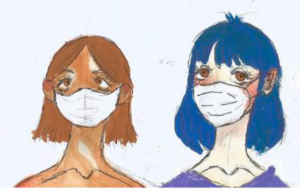News . Best Practices Memes and cartoons: Brazilian way in the Covid-19 pandemic (Best Practice Brazil)

This open scenario practice was carried out during the pandemic by Professor Francieli Constantini in the discipline Philosophy and Sociology on the theme “Memes and cartoons: Brazilian way in the Covid-19 pandemic”, at the School of Basic Education Professor Adelina Régis. Students interacted with social scientists, educational researchers, and the local community, including family members. It was supported by APC PUC-PR
CARE: The students were involved in the discussion about the COVID-19 contingency plan. The participants were 120 students, aged between 14 and 16, from the 1st grade of high school, 78 of whom completed the scientific action, with their families, a teacher, a researcher, and a scientist who shared their concerns about COVID-19 and ideas for creating memes and cartoons, to contextualize the Brazilian Federal Declaration with the pandemic, highlighting human and citizen rights and duties.
KNOW: They were developed, in an interdisciplinary and transdisciplinary way, with the school curriculum integrating the disciplines of Sociology and Philosophy in the analysis of historical and scientific data. Thus, it was possible to understand the laws that ensure the right of citizens in times of COVID-19, permeated by the concepts of Citizenship, Citizen, Cultural Identity and Declaration of the Rights of Man and Citizen, in view of the contingency plan proposed for the pandemic.
In the teaching and learning processes, the skills developed addressed the student’s ability to contextualize the rights of the citizen with the reality found in urban spaces with COVID-19, as well as the ability to interpret the laws and make them accessible to everyone who wants to know to improve their quality of life.
As for the attitudes to be developed, we sought to promote empathy to overcome the “chaos” caused by epidemics and pandemics; the appreciation of reflections on the Brazilian Federal Constitution for new approaches to knowledge, in addition to enabling new forms of learning emphasizing social relationships, ethics and respect for life.
DO: Students were involved in the following activities:
- Bibliographic research on the subject.
- Research in documentary sources and images.
- Analysis of scientific articles on the relationship between the declaration of human and citizen’s rights with the actions and attitudes of the population in the pandemic.
- Classroom debate on the Brazilian Federal Constitution.
- Preparation of pamphlets such as memes and cartoons about “how do people act today in the pandemic?” and “How should people act on COVID-19?”
- Socialization of visual production and reflections punctuated with an emphasis on the pandemic.
FINDINGS: The open scenario methodology used was project-based collaborative learning. Students brought their own questions, discussed with the scientists and their families. Teachers found the open teaching activity useful for the Contextualization of the Brazilian Federal Declaration with the pandemic highlighting human and citizen rights and duties. Teaching by area of knowledge facilitated the planning of actions, the applicability of learning activities, the use of technological resources and curricular interaction based on integrated projects.
OUTCOMES: The participation, engagement, and interest of students in the development of activities related to citizen rights in the COVID-19 pandemic. It was significant and surprising in the way they adhered to the proposal to know the Brazilian Federal Constitution. Most students did not know the rights of citizens. The relationship between legal laws and the pandemic was discussed with the students, arousing interest in knowing more and engaging in the activities of memes and cartoons presenting the Brazilian way in the pandemic. In a fun way, students were able to express their criticisms they felt about COVID-19.
During the learning activities, the students felt confident about their opinion on the rights of the citizen contextualized with the pandemic. Discussions about the Brazilian Federal Constitution aroused curiosity about the rights and duties of citizens defined by law. It is observed that the students were more confident in their speeches about Politics, Science and COVID-19.
However, the very social distancing generated by the pandemic period caused many disruptions in the school routine, among which they made it impossible to contact scientists or, in this case, jurists or political analysts. The return of face-to-face classes with 50% of the students, in the form of a rotation, reduced the time for carrying out the learning activities. On the other hand, some students were not included in the study for reasons.
Find out more here: Our report.